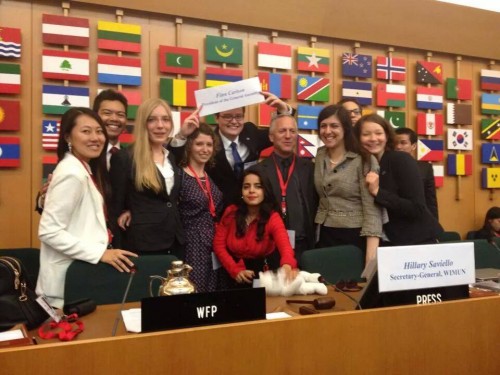America and Canada may not realise it, but the European university circuit now has more conferences than the North American circuit. Although the European university circuit has been long established, it has recently seen explosive growth in terms of the number of conferences and societies proliferating across a wide range of countries.
This got me thinking: what are the competitive advantages of doing university-level Model UN in Europe compared to North America? Here are the three biggest differentiators that I can think of.
Why Europe is Better
1. Conferences are more international
Model UN conferences are in almost every European country, and no country besides the UK has an active circuit of local conferences. Consequently, delegates tend to attend MUN conferences outside of their own countries and the conferences are very diverse in terms of the attendees’ backgrounds. This creates a much richer educational and cultural experience inside and outside of committee. Furthermore, European MUN societies are much more prone to traveling to conferences outside of Europe. In contrast, delegates in North America rarely encounter delegates from other countries outside of North America except at the largest conferences, and few teams travel to conferences outside of North America. In the words of one foreign delegate at a major US conference: how can they learn about the world if all they’re interacting with is Americans?
2. The atmosphere is more friendly
Model UN conferences in Europe are on average smaller, less competitive, host classier social events, have a higher percentage of individual delegates, and draw participants who seriously care about the United Nations. The combination of these factors creates an environment that is much more suited to making friends than at competition-oriented and team-oriented North American conferences. It’s much easier to not only meet people but to get to know them. To me, the one thing that best points out this difference is the European tradition of taking committee and conference-wide photos together; this exemplifies the importance of remembering everyone in your committee and at your conference.
3. There are more chairing opportunities
The best Model UN delegates in Europe move on to become chairs, and the European system allows Chairs to apply to Chair at pretty much any conference. In fact, some MUN participants pretty much just become Chairs at some point of their career and go on to Chair multiple conferences in different countries each year — these Chairs end up becoming part of an elite multinational network of experienced MUNers. In contrast, North American participants who want to Chair are mostly limited to whatever conferences their MUN club hosts.
Why North America is Better
1. The Model UN career is more comprehensive
Model UN programs at North American universities tend to be more established. Many of them offer a combination of fielding a travel team (to both traditional and crisis conferences), hosting one to three conferences (university, high school, middle school), academic or educational programming such as speakers, social activities, outreach, journals, and more. There is so much more a MUN participant can do as part of their MUN experience, and there is institutional support and even funding for those experiences. In contrast, most university MUN societies in Europe do not offer all these activities, and the more serious delegates have to patch together different experiences by applying as individual delegates to conferences, applying to chair at outside conferences, or combining with participants from other universities in order to host a MUN conference, attend an academic event, or even field a united country-wide team to attend a conference.
2. Competition creates more experienced delegates
Model UN conferences in North America are significantly more competitive and larger on average than European MUN conferences. One could argue that delegates have not been challenged by the best until they have been to a pinnacle, top-tier conference such as HNMUN or NMUN, or even conferences like UPMUNC, McMUN, or ChoMUN that are significantly more competitive than a conference of equal size in Europe. This leads to a higher quality of debate as many teams seek to win awards, and the side effect is that teams tend to put more emphasis into team training so that they can help their delegates improve in quality. In addition, there is a lot more intra-team and inter-team camaraderie since delegates spend much time and multiple conferences seeing their teammates and delegates from other teams.
3. MUN helps with career prospects
The skills and experiences that are gained through the delegate and conference organising experience are transferrable to a variety of career fields, and employers in a wide range of industries in the US and Canada seem to value those skills and experiences more than employers in Europe that seem to focus on pure academic credentials. This is probably attributed more to culture than efforts North American MUN organisations have made to market their value, but nevertheless there is a career ‘return-on-investment’ for the MUN experience beyond its educational value and fun factor.
**
Of course, these are just competitive advantages I have observed but they are not mutually exclusive. There are European MUN societies (especially in the UK) that do more than just go to conferences, there are competitive delegates in Europe, and there are MUNers whose MUN experience has helped them get a job. And there are some North American conferences where delegates come from several countries or North American teams that travel outside the continent, there are friendly delegates in North America, and there are chairing opportunities (especially with non-profit hosted conferences) for North American delegates outside of their own university. Model UN is a great experience regardless of where one does it, but perhaps the most well-rounded experience at the university level is to try MUN in both Europe and North America.
Have you done university-level MUN in both North America and Europe? What do you think?


